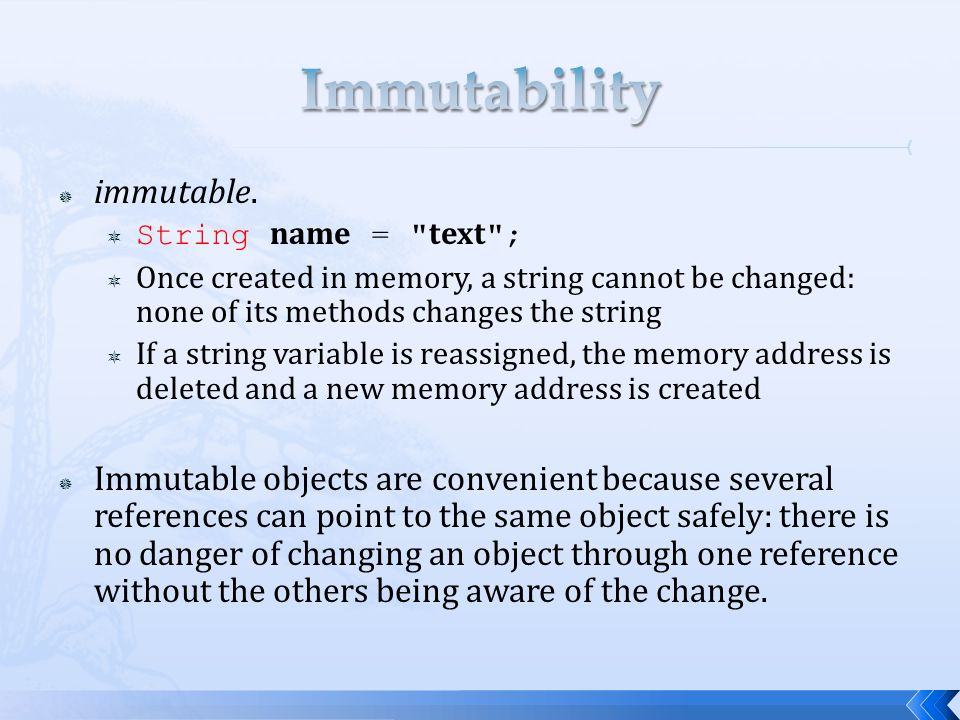Why Are Strings Immutable in Java? Ideal Practices and Usage Cases
Why Are Strings Immutable in Java? Ideal Practices and Usage Cases
Blog Article
What Is Unalterable Strings and Just How It Functions
In the realm of programs, understanding the concept of immutable strings is vital for developing durable and safe applications. Immutable strings refer to strings that can not be modified after they are developed, ensuring information honesty and predictability within the code. This basic principle plays a vital duty in numerous shows languages and supplies a distinct approach to handling data. By exploring the intricacies of exactly how unalterable strings function, one can uncover a world of benefits and possibilities that can elevate the top quality and efficiency of software program advancement.
The Essentials of Unalterable Strings
Unalterable strings, as a fundamental concept in programming, are personality sequences that can not be transformed as soon as they are created. This means that when a string is assigned a value, that worth can not be altered. In languages like Python and Java, strings are unalterable things, causing various effects in terms of memory monitoring and data honesty.
Among the key benefits of unalterable strings is that they offer a complacency in data adjustment. Considering that the material of an unalterable string can not be customized, it ensures that the original data remains undamaged, reducing the risk of unexpected modifications throughout program implementation (Why are strings immutable in Java?). This residential or commercial property likewise streamlines debugging procedures, as designers can trust that as soon as a string is defined, its worth will certainly not be unintentionally altered
When a brand-new string is created based on an existing one, instead than changing the original string, the brand-new worth is kept individually. On the whole, recognizing the fundamentals of immutable strings is critical for understanding programming ideas and maximizing code efficiency.
Advantages of Immutable Strings
Building upon the protection and performance advantages of unalterable strings, their benefits reach enhancing code reliability and streamlining simultaneous programs tasks. By being immutable, strings can not be modified after creation, which gets rid of the risk of unplanned modifications in the information they keep. This integral immutability ensures that once a string is created, its value stays constant throughout the program's execution, reducing the chances of bugs brought on by unanticipated changes.
Furthermore, immutable strings add to code integrity by making it less complicated to reason regarding the state of a program. Because strings can not be transformed, programmers can trust that a string will constantly hold the same worth, streamlining debugging and maintenance initiatives. This predictability results in much more dependable and steady codebases.

Application in Shows Languages
Within various programs languages, the consolidation of unalterable strings is an essential aspect that affects how data is handled and manipulated within code frameworks. The implementation of unalterable strings varies throughout different shows languages, with each language providing its own systems to support this idea.

On the other hand, languages like C and C++ do not have built-in support for immutable strings. Programmers in these languages must by hand implement immutability by applying guidelines within their code to avoid direct adjustments to string objects.
Finest Practices for Collaborating With Immutable Strings
When taking care of immutable strings in shows languages like Java and Python, sticking to ideal methods makes certain protected and effective information manipulation. One of the vital best techniques is to make use of StringBuilder or StringBuffer instead of straight manipulating strings, particularly when handling substantial concatenation operations. These classes offer mutable choices for string control, aiding to stay clear of unneeded memory allowances and enhancing performance.
Additionally, when functioning with delicate data such as passwords or API tricks, it is critical to stay clear of saving them as ordinary text in unalterable strings. Utilizing protected storage space mechanisms like char ranges or specialized libraries for handling delicate details aids alleviate protection risks linked with unalterable strings.
Real-world Applications and Examples
Checking out sensible applications of immutable strings in numerous sectors discloses their significant effect on information stability and system reliability. In the medical care field, unalterable strings play a crucial role in making certain the protection and confidentiality of patient information. By stopping unauthorized alterations to sensitive info such as medical documents and prescriptions, immutable strings assist keep compliance with stringent privacy laws like HIPAA.
Banks likewise take advantage of the unalterable nature of strings to boost the safety of consumer information and deal documents. Immutable strings aid stop fraudulence and unauthorized changes to financial information, providing a robust protection against cyber threats and making certain the count on and self-confidence of customers.

Conclusion
Finally, immutable strings are repaired and stable sequences of personalities that offer advantages such as string safety and improved performance in programs. They are executed in look at this site numerous shows languages to make certain information stability and safety and security. Finest practices for dealing with unalterable strings include preventing straight adjustments and utilizing approaches that return new string items. Real-world applications of unalterable strings consist of data file encryption, caching, and string manipulation jobs.
Unalterable strings refer to strings that can not be changed after they are created, ensuring data honesty and predictability within the code. When a brand-new string is developed based on an existing one, rather than changing the initial string, the new value is kept independently.In languages like Java and Python, strings are unalterable by default, suggesting that as soon as a string things is produced, its value can not be altered - Why are strings immutable in Java?. Finest methods for working with immutable strings include avoiding straight alterations and using approaches that return new string things. Real-world applications of unalterable strings include information security, caching, and string control tasks
Report this page